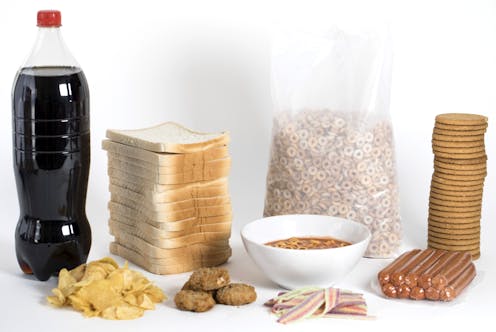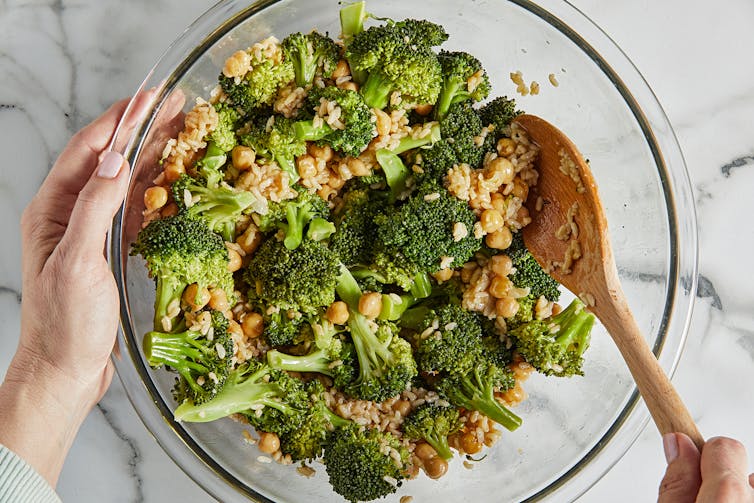
The proverbial “sugar high” that follows the ingestion of a sweet treat is a familiar example of the potentially positive effects of food on mood.
On the flip side, feeling “hangry” – the phenomenon where hunger manifests in the form of anger or irritability – illustrates how what we eat, or don’t eat, can also provoke negative emotions.
The latest research suggests that blood sugar fluctuations are partly responsible for the connection between what we eat and how we feel. Through its effects on our hormones and our nervous system, blood sugar levels can be fuel for anxiety and depression.
Mental health is complex. There are countless social, psychological and biological factors that ultimately determine any one person’s experience. However, numerous randomized controlled trials have demonstrated that diet is one biological factor that can significantly influence risk for symptoms of depression and anxiety, especially in women.
As a family medicine resident with a Ph.D. in nutrition, I have witnessed the fact that antidepressant medications work for some patients but not others. Thus, in my view, mental health treatment strategies should target every risk factor, including nutrition.
Table of Contents
The role of the glycemic index
Many of the randomized controlled trials that have proven the link between diet and mental health have tested the Mediterranean diet or a slightly modified version of it. The Mediterranean diet is typically characterized by lots of vegetables – especially dark green, leafy vegetables – fruit, olive oil, whole grains, legumes and nuts, with small amounts of fish, meat and dairy products. One of the many attributes of the Mediterranean diet that may be responsible for its effect on mood is its low glycemic index.
The glycemic index is a system that ranks foods and diets according to their potential to raise blood sugar. Thus, in keeping with the observation that blood sugar fluctuations affect mood, high glycemic index diets that produce drastic spikes in blood sugar have been associated with increased risk for depression and to some extent anxiety.
High glycemic index carbohydrates include white rice, white bread, crackers and baked goods. Therefore, diets high in these foods may increase risk for depression and anxiety. Meanwhile, low glycemic index carbs, such as parboiled rice and al dente pasta, that are more slowly absorbed and produce a smaller blood sugar spike are associated with decreased risk.

The Washington Post/Getty Images
How diet affects mood
Many scientific mechanisms have been proposed to explain the connection between diet and mental health. One plausible explanation that links blood sugar fluctuations with mood is its effect on our hormones.
Every time we eat sugar or carbohydrates such as bread, rice, pasta, potatoes and crackers, the resulting rise in blood sugar triggers a cascade of hormones and signaling molecules. One example, dopamine – our brain’s pleasure signal – is the reason we can experience a “sugar high” following the consumption of dessert or baked goods. Dopamine is the body’s way of rewarding us for procuring the calories, or energy, that are necessary for survival.
Insulin is another hormone triggered by carbohydrates and sugar. Insulin’s job is to lower blood sugar levels by escorting the ingested sugar into our cells and tissues so that it can be used for energy. However, when we eat too much sugar, too many carbs, or high glycemic index carbs, the rapid increase in blood sugar prompts a drastic rise in insulin. This can result in blood sugar levels that dip below where they started.
This dip in blood sugar sparks the release of adrenaline and its cousin noradrenaline. Both of these hormones appropriately send glucose into the bloodstream to restore blood sugar to the appropriate level.
However, adrenaline influences more than just blood sugar levels. It also affects how we feel, and its release can manifest as anxiety, fear or aggression. Hence, diet affects mood through its effect on blood sugar levels, which trigger the hormones that dictate how we feel.
Interestingly, the rise in adrenaline that follows sugar and carbohydrate consumption doesn’t happen until four to five hours after eating. Thus, when eating sugar and carbs, dopamine makes us feel good in the short term; but in the long term, adrenaline can make us feel bad.
However, not everyone is equally affected. Identical meals can produce widely varying blood sugar responses in different people, depending on one’s sex, as well as genetics, sedentariness and the gut microbiome.
And it’s important to keep in mind that, as previously mentioned, mental health is complicated. So in certain circumstances, no amount of dietary optimization will overcome the social and psychological factors that may underpin one’s experience.
Nevertheless, a poor diet could certainly make a person’s experience worse and is thus relevant for anyone, especially women, hoping to optimize mental health. Research has shown that women, in particular, are more sensitive to the effects of the glycemic index and diet overall.
Unfortunately, simple solutions, such as swapping sugar for artificial sweeteners, are not an option. Research has shown that among all processed foods, artificial sweeteners and artificially sweetened beverages are most strongly associated with depression.
Optimizing mood with food
The most obvious way to stabilize blood sugar levels is to decrease sugar and carbohydrate intake. However, this is not the only way. Research has proven that simple changes can drastically mitigate volatile blood sugar fluctuations. Some strategies to stabilize blood sugar and optimize mood include:
-
Make low glycemic index carbohydrates such as parboiled rice, whole grain bread and al dente pasta dietary staples and be mindful of how many high glycemic index carbohydrates you consume. I give my patients this guide to increase their awareness of the glycemic index of various carbohydrates.
-
Eat carbohydrates earlier in the day such as breakfast or lunchtime, as opposed to later in the day, like dinner or, worse yet, as a nighttime snack. Our hormones follow a circadian rhythm, and carbs eaten earlier in the day produce a smaller blood sugar spike compared with carbs eaten later in the day.
-
Avoid eating carbohydrates on their own, such as snacking on a box of crackers or downing a bowl of rice. Always strive to combine carbohydrates with proteins such as beans, nuts, meat and fish, or with healthy fats such as olive oil and avocado. The combination of nutrients slows down the digestion of carbohydrates and thereby produces a smaller blood sugar spike.
-
Eat carbohydrates at the end of the meal, after eating vegetables and protein first. Just changing the order in which foods are eaten can drastically lower the blood sugar spike that comes after.
-
Eat a salad dressed with olive oil and vinegar prior to eating carbohydrates. The combination of vegetables, acid from the vinegar and fat from the olive oil, all work together to slow carbohydrate absorption and minimize the resultant blood sugar spike.
![]()
Mary Scourboutakos does not work for, consult, own shares in or receive funding from any company or organization that would benefit from this article, and has disclosed no relevant affiliations beyond their academic appointment.
























